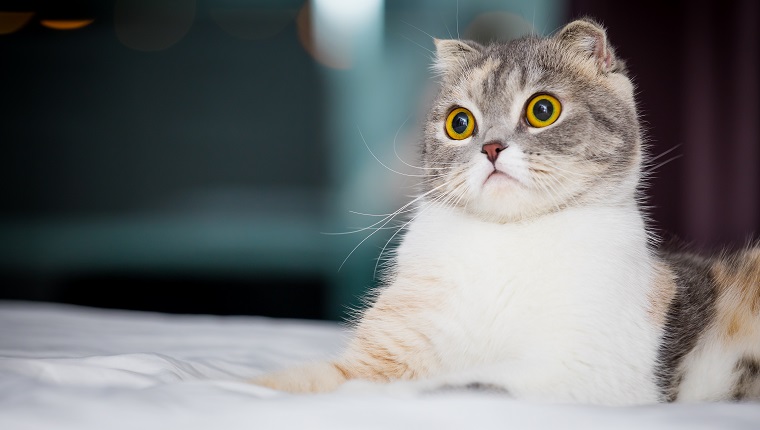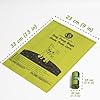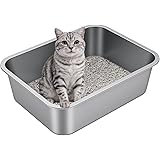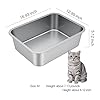Temptations Wacky Blasts Cat Treats, Cluckin’ Bacon Flavor, 16 oz. Tub
$8.48 (as of February 24, 2026 15:46 GMT +00:00 - More infoProduct prices and availability are accurate as of the date/time indicated and are subject to change. Any price and availability information displayed on [relevant Amazon Site(s), as applicable] at the time of purchase will apply to the purchase of this product.)Paw-Positively Irresistible Cat Treats: These wacky cat treats are made with chicken and bacon flavors as well as flavor bits of catnip you can see Cats Lose Their Cool: Your cat can’t wait to get their paws on these irresistible cat training treats ... read more
Smiry Dog Door Mat for Muddy Paws, Absorbent Dirt Trapper Non Slip Quick Dry Washable Chenille Mat for Mud Dogs, Entry Rug for Indoor and Outdoor (30x20 Inches, Grey and Black)
$9.59 (as of February 24, 2026 15:52 GMT +00:00 - More infoProduct prices and availability are accurate as of the date/time indicated and are subject to change. Any price and availability information displayed on [relevant Amazon Site(s), as applicable] at the time of purchase will apply to the purchase of this product.)[Soft and Comfortable Chenille] Smiry luxury chenille door mat soft and comfortable to touch, offers exceptional comfort and support for your feet. Furthermore, your furry friends will surely appreciate the added layer of coziness on cold floors. Its... read more
GREENER WALKER Poop Bags for Dog Waste-540 Bags,Extra Thick Strong 100% Leak Proof Dog waste Bags (Brown)
$16.99 (as of February 24, 2026 19:17 GMT +00:00 - More infoProduct prices and availability are accurate as of the date/time indicated and are subject to change. Any price and availability information displayed on [relevant Amazon Site(s), as applicable] at the time of purchase will apply to the purchase of this product.)Keep Your Hands Safe: Our poo bags are 100% leak-proof and extra thick, never worry about your hands when you pick the poo up. Super Value Pack: 36 rolls and 15 bags per roll, total 540 bags can supply up to 9 months(2 bags per day). About Measures: ... read more
Purina Fancy Feast Gravy Lovers Poultry and Beef Grilled Gourmet Wet Cat Food Variety Pack - (Pack of 24) 3 oz. Cans
$22.86 (as of February 24, 2026 15:46 GMT +00:00 - More infoProduct prices and availability are accurate as of the date/time indicated and are subject to change. Any price and availability information displayed on [relevant Amazon Site(s), as applicable] at the time of purchase will apply to the purchase of this product.)Cat food with gravy, made without artificial colors or preservatives Purina Fancy Feast canned cat food variety pack crafted with real, high-quality ingredients, like real poultry or beef, to deliver 100 percent complete and balanced food for adult c... read more
Temptations Wacky Blasts Cat Treats, Nautical Nip’ Flavor, 16 oz. Tub
$8.48 (as of February 24, 2026 15:46 GMT +00:00 - More infoProduct prices and availability are accurate as of the date/time indicated and are subject to change. Any price and availability information displayed on [relevant Amazon Site(s), as applicable] at the time of purchase will apply to the purchase of this product.)Paw-Positively Irresistible Cat Treats: These wacky cat treats are made with salmon and shrimp flavors as well as flavor bits of catnip you can see Cats Lose Their Cool: Your cat can’t wait to get their paws on these irresistible cat training treats ... read more
Amazon Basics Dog Poop Leak Proof Bags with Dispenser and Leash Clip, Unscented, 13" x 9" Large Size, 300 Count
$9.50 (as of February 24, 2026 15:52 GMT +00:00 - More infoProduct prices and availability are accurate as of the date/time indicated and are subject to change. Any price and availability information displayed on [relevant Amazon Site(s), as applicable] at the time of purchase will apply to the purchase of this product.)Dog poop bags for quick, easy pick-ups Neatly contains waste and minimizes odors Leakproof design keeps hands clean and protected Includes 300 unscented plastic bags (15 bags per roll; 20 rolls), a dispenser, and a matching leash clip Large 13 x 9-in... read more
Zesty Paws Hip and Joint for Dogs, Glucosamine for Dogs Hip and Joint Supplement with Chondroitin, MSM, Vitamins C & E - Bacon, 50 Count
$24.97 (as of February 24, 2026 19:17 GMT +00:00 - More infoProduct prices and availability are accurate as of the date/time indicated and are subject to change. Any price and availability information displayed on [relevant Amazon Site(s), as applicable] at the time of purchase will apply to the purchase of this product.)PREMIUM HIP & JOINT SUPPORT: These dog joint supplement large breed chews, including Glucosamine and Chondroitin, promote joint health to keep your dog active and playful FEATURING OPTIMSM: Each hip and joint chews for dogs contain 400 mg of OptiMSM,... read more
INABA Churu Cat Treats, Grain-Free, Lickable, Squeezable Creamy Purée Cat Treat/Topper with Vitamin E & Taurine, 0.5 Ounces Each Tube, 50 Tubes, Tuna & Chicken Variety
$32.99 (as of February 24, 2026 15:46 GMT +00:00 - More infoProduct prices and availability are accurate as of the date/time indicated and are subject to change. Any price and availability information displayed on [relevant Amazon Site(s), as applicable] at the time of purchase will apply to the purchase of this product.)MADE WITH WHOLESOME INGREDIENTS YOU CAN TRUST: Every Inaba product is made with yummy, human-grade ingredients including farm-raised chicken and/or wild-caught tuna KEEP YOUR FELINE HYDRATED WITHOUT ADDING CALORIES: Each delicious, creamy Churu tube ... read more
TFNN Reptile Heat Lamp, Heat Lamp with Clamp, UVA UVB Reptile Light with Intelligent Cycle Timer for Turtle, Bearded Dragon, Lizard and More, 2 Bulbs 50W+75W
$18.99 (as of February 24, 2026 15:52 GMT +00:00 - More infoProduct prices and availability are accurate as of the date/time indicated and are subject to change. Any price and availability information displayed on [relevant Amazon Site(s), as applicable] at the time of purchase will apply to the purchase of this product.)【Newly Upgraded Bell-Mouth Design】 :This newly upgraded heating lamp with a TFNN bell-mouth design provides a wider range of UVA/B ultraviolet rays compared to the design of ordinary models. It can simultaneously heat and illuminate multiple reptiles... read more
Idymere Stainless Steel Litter Box with High Sided, Metal Cat Litter Box, Odor-Free, Non-Stick Litterbox Pan, Easy to Clean Pet Supplies Toilet Tray for Indoor Cats, Kittens or Multicat Homes
$18.29 (as of February 24, 2026 15:52 GMT +00:00 - More infoProduct prices and availability are accurate as of the date/time indicated and are subject to change. Any price and availability information displayed on [relevant Amazon Site(s), as applicable] at the time of purchase will apply to the purchase of this product.)Large Capacity: The Idymere stainless steel litter box measures 16.93"L x 12.99"W x 5.12"H, offering ample space for kitty, kittens, elderly cats or medium cats to do their business comfortably. This litter box is ideal for single or multiple small-c... read more





























































